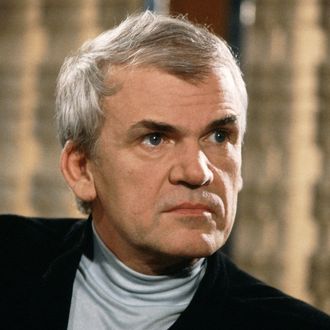
Photo: Louis Monier/Gamma-Rapho via Getty Images
“Man, living his one life, is condemned to that one fatal experience,” Milan Kundera, the Czech French writer known for The Unbearable Lightness of Being, told the New York Times in 1984. Kundera died in his Paris apartment on June 11 at 94. “He can never know if he was a good man or a bad man, if he loved anyone or if he had only the illusion of love,” his quote continues. “He gets older and older, entering each new moment of his life equally innocent, and then one day he is old without ever knowing what old age is. His old age is merely his newest experience. He enters it as stupid as he entered the world. Einmal ist keinmal [one time is no time].” Kundera’s time began on April 1, 1929, in the town Brno in what was then known as Bohemia and is now the Czech Republic. He joined the Czech Communist Party in 1948 while in Charles University in Prague and was expelled from the party in 1950 for “individualistic tendencies” but rejoined from 1956 through 1970. His first novel, The Joke, a satire about life under a totalitarian regime, was published in 1967.
In 1968, his homeland, then known as Czechoslovakia, was invaded by members of the Soviet Union–controlled Warsaw Pact, and, owing to his involvement in 1968’s Prague Spring, the mass protest for the rights of Czech citizens that was used by the Soviet Union as the pretext for invasion, Kundera was stripped of his teaching position and his books were banned. In 1975, Kundera left the country with his wife for a short stint at the University of Rennes in France. He ended his time there in political exile owing to official Czechoslovakian response to his 1979 novel The Book of Laughter and Forgetting and spent the rest of his days in Paris, becoming a French citizen in 1981. His most famous novel, The Unbearable Lightness of Being, was published in 1984. Upon its publication, he remarked to the Times that “I can honestly say that I feel much better here in Paris than I did in Prague, but then can I also say that I lost my home, leaving Prague? All I know is that before I left I was terrified of ‘losing home’ and that after I left I realized — it was with a certain astonishment — that I did not feel loss, I did not feel deprived.”
The Unbearable Lightness of Being became a best seller and was adapted into a 1988 film starring Daniel Day-Lewis and Juliette Binoche. Kundera, off the strength of books including The Book of Laughter and Forgetting, The Unbearable Lightness of Being, and 1990’s Immortality, became known as one of the great novelists of the late-20th century. “The sole raison d’être of a novel is to discover what only the novel can discover,” he wrote in his 1986 book The Art of the Novel. “A novel that does not discover a hitherto unknown segment of existence is immoral. Knowledge is the novel’s only morality.” He won awards including the Prix Mondial Cino Del Duca, the Franz Kafka Prize, and the Herder Prize. In 2019, his Czech citizenship was restored. “This is a very important symbolic gesture, a symbolic return of the greatest Czech writer in the Czech Republic,” Petr Drulák, the Czech Republic’s ambassador to France, said at the time, according to The Guardian. “He was in a good mood, just took the document and said thank you.”
Article From & Read More ( Milan Kundera, 'Unbearable Lightness of Being' Author, Dead - Vulture )https://ift.tt/0t7DdKI
Entertainment
Bagikan Berita Ini














0 Response to "Milan Kundera, 'Unbearable Lightness of Being' Author, Dead - Vulture"
Post a Comment